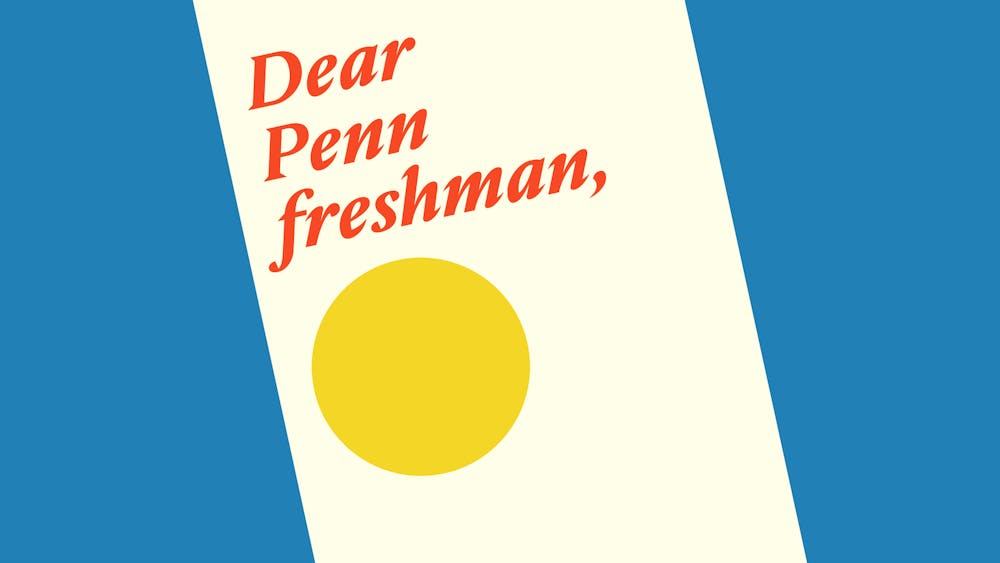
Student initiative "Dear Penn Freshmen" is returning this year — featuring a collection of letters written by Penn upperclassmen addressing their first-year selves about the things they wish they knew in their first year.
The student initiative — born out of Adam Grant’s 2016 "Organizational Behavior" class — is collecting submissions until Friday and will publish the letters on the "Dear Penn Freshmen" website on April 22.
College senior Margaret Cheng, one of the three students running the project, expects to publish at least 50 letters later this month. "Dear Penn Freshmen" will also host a launch party where students can obtain physical copies of the collection, and those who have submitted can read their letters out loud.
The project, created in 2015 by Wharton graduate Lauren McCann and restarted in 2018, aims to break the stigma of “Penn Face” and offers underclassmen advice from all corners of Penn’s campus.
Letters have previously included a combination of advice, anecdotes, and random thoughts on topics including school, career, relationships, and living in Philadelphia. Submissions can be anonymous, though authors also have the option of including their email addresses so readers can reach out to them for additional advice.
“I feel like it's necessary to have a space that is so vulnerable and genuine and real. 'Penn Face' is definitely real, and it's something I and many other students encountered our freshman year. I was not ready for it,” Cheng said. “Over time, I felt myself feeling really alone in how I felt. When I found 'Dear Penn Freshmen' and found that the whole goal is to counter that culture, I really fell in love with it.”
Since its first publication in 2016, "Dear Penn Freshmen" has earned the attention of several local and national outlets, including NBC News and The Philadelphia Inquirer. Students from other schools have since reached out about starting a similar initiative on their own campuses, including a South Korean university, Cheng said.
Cheng first learned about the project as a sophomore and said it would have been "comforting" to see advice from seniors in writing during her first year at Penn.
“I think at that moment, I felt so alone in some of the things I felt. But actually so many people have felt this way and it's okay,” Cheng said.
As an underclassman, 2021 College graduate Lark Yan learned about the "Dear Penn Freshmen" project from friends and was inspired by the letters to submit her own. Yan, who graduated in December but will be walking with the Class of 2022 in May, said she hopes that writing a letter will provide first years with valuable advice and allow her to reflect on her own time at Penn.
“In hindsight, I wished I had the guts to take the time to look at the more unconventional things that you can do beyond Penn, whether it's taking a gap year, studying abroad somewhere, doing a language immersion program, or going to grad school in a niche field that you're really passionate about,” Yan said. “It sounds super cliche, but ultimately, you're the one who's living your life, and you're the one who's gonna have to reap the consequences or gain from the benefits.”
In her letter, Yan aims to address the way that Penn students discuss their careers and professional ambitions.
“There is this one-track narrative that Penn tends to push on you, which is that you go into college and then you're expected to graduate with a very clear-cut, formulated calling,” Yan described. “Once you graduate, you need to enter corporate — specifically consulting and banking — and those are the only options for you. If you don't do it, you're wasting your time at Penn, or you're not fully utilizing the resources here," Yan said.
College first year Amelia Stoesser said that even though she has been at Penn for less than a year, she has definitely experienced the “Penn Face” phenomenon and likes the idea of “seniors sharing what worked for them.”
“I think it would be interesting to read the letters. I also think it's good because a lot of times students have trouble actually reaching out to people to ask for advice for fear that they might look stupid or not ask the right question,” Stoesser said. “I think that having something to just read through and look through — to gain different perspectives to give you an idea of what you feel lost on or what you could work on — is really helpful.”
The Daily Pennsylvanian is an independent, student-run newspaper. Please consider making a donation to support the coverage that shapes the University. Your generosity ensures a future of strong journalism at Penn.
Donate







